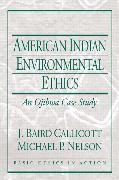Read more
J. Baud Callicott and Michael P. Nelson offer an engaging study of environmental ethics with particular emphasis on an ethics supported by the Ojibwa cultural worldview. Connecting environmental theory with diverse stories from Ojibwa Indians, Callicott and Nelson reveal the meaning and power of cultural worldviews as they inform ethical principles and practices, as they show that competing worldviews demonstrate the many ways "of cognitively organizing human experience." The authors begin with a concise treatment of environmental ethics, cultural worldviews, and the problem of cultural relativism, and integrate and evaluate rarely seen narratives of Ojibwa Indians on their relationship to the environment.
American Indian Environmental Ethics is the seventh book in the series, Basic Ethics in Action, edited by Michael Boylan. This series is a major new undertaking by Prentice Hall covering several areas in applied ethics, including business ethics, environmental ethics, medical ethics, and social and political ethics.
List of contents
I. INTRODUCTORY ESSAY: CULTURAL WORLDVIEW AND ENVIRONMENTAL ETHICS.
1. What is Environmental Ethics?
2. What is a Cultural Worldview?
3. What is Culture?
4. Language, Worldview, and Cultural Relativism.
5. The Ojibwa Narratives.
II. THE NARRATIVES.
1. The Orphans and Mashos.
2. Clothed-in-Fur.
3. The Woman Who Married a Beaver.
4. The Boy that was Carried Away by a Bear.
5. A Moose and His Offspring.
6. Little-Image.
7. The Person that Made Medicine.
8. The Birth of Nänabushu.
9. Nänabushu Swallowed by the Sturgeon.
10. Nänabushu Slays Here-of-His-Shin.
11. Nänabushu Leaves His Brother, and Also His Grandmother.
12. Nänabushu, the Sweet-brier Berries, and the Sturgeons.
13. Notes on the Mystic Rite.
III. INTERPRETIVE ESSAY: AN OJIBWA WORLDVIEW AND ENVIRONMENTAL ETHIC.
1. Key Cognitive Elements of an Ojibwa Worldview.
2. Ojibwa Environmental Ethics.
3. The Controversy About American Indian Environmental Ethics.
Literature Cited.
About the author
J. Baird Callicott is Professor of Philosophy at -the University of North Texas, and an eminent author in the field of environmental ethics.
Michael P. Nelson is Professor of Philosophy and Natural Resources at the University of Wisconsin, Stevens Point.
Summary
For courses in anthropology, cultural geography, environmental philosophy and ethics.
Brief text focusing on environmental attitudes and practices of American Indians using the Ojibwa narrative, myths, legends, stories and rituals. Introductory essay offers theory of environmental ethics, an overview of the field of environmental ethics, and places the Ojibwa within this contemporary debate. “Part of the applied ethics series, Basic Ethics in Action, edited by Michael Boylan.”

